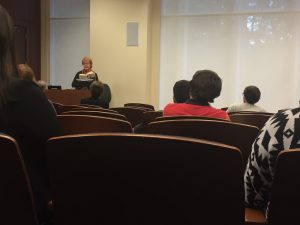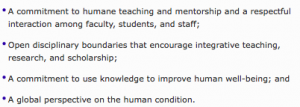As I slowly walked towards the Oxford Road Building, my head was filled with memories of the few previous Williams Memorial lectures I attended, including one where a certain someone gave the entire audience a cold. Even though I was required to attend all the Williams lectures for my physics course, not even one of them has been remotely close to the subject. I arrived at the lecture room, I checked my calendar on Canvas and saw that the lecture topic was “Great Works of Palaeontology”. This caused me immediately to think of Jurassic Park and life from way back. I mentally prepared myself to listen to a speech about some dinosaur books for 45 minutes and took a seat.

As the doors closed, the lecturer, Dr. Lipstadt, was introduced as Emory’s most famous professor. I recognized the name, but couldn’t quite remember where I had heard it. Strangely enough, the introduction had nothing to do with dinosaurs, but instead talked about Dr. Lipstadt’s work as a Jewish historian, disproving Holocaust deniers in legal court. At this moment, I remembered where I had heard the name: I had seen countless trailers for a movie which is based on “Emory’s most famous professor” and her battle to fight Holocaust denial. I also realized that palaeontology is not limited to dinosaurs.
Dr. Lipstadt started her lecture in a similar fashion to all the other Williams lectures, claiming that it is difficult to choose a few books to talk about since there are so many “history-changing” books about the Holocaust. Therefore, she decided to present the books that spoke to her the most. These books were mostly memoirs or diaries. The first person perspective that they gave and the specifics that they went into were able to paint a picture in my head.

I enjoyed the way Dr. Lipstadt presented the books she brought with. She would start by flipping open a book, which she would read until she found a good place to stop. After closing the book, she would then explain to the audience in very specific detail what was going on in the time frame she had just read about. Her explanations gave a lot of insight on the Jewish situation inside the ghettos during the war. For example, Dr. Lipstadt told a story of how in the ghetto, there were specific Jews who were responsible for being the intermediary between the Nazis and the ghetto residents. These people always saw the list of Jews who were taken out of the ghetto. In one particular ghetto, this intermediate person between the Nazis and ghetto residents would always convict himself that the people were being taken away to do labor. However, when he saw that children started to appear on the list, he couldn’t stand it anymore and took his own life. The stories like these that Dr. Lipstadt told really brought the books she presented to life.

The crowd at the lecture was mostly students who were forced to be there, due to their class being in the Voluntary Core Curriculum like mine. There was also the usual group of older people there, who were attending just to hear Dr. Lipstadt’s words. Even though I found the lecture very engaging, about half of the students who I saw were on their mobile devices for the entire lecture. Also, at the end of the lecture during the question and answer period, I noticed that the audience had much fewer questions than what was normal for a Williams lecture. This was probably due to the fact that Jewish studies is a less popular subject area at Emory than what the previous lectures had been about (law, psychology, etc.). This might also explain the unengaged audience who were there just to get an attendance grade. I think that if she were to relate her stories she told back to her time in court fighting against Holocaust deniers, as well as the movie that was recently made, the lecture could have been more intriguing than it already was.

Overall, I think that Dr. Lipstadt’s lecture was incredibly insightful. Having gone to a Jewish school, I was exposed to memoirs of the Holocaust and talks from survivors from a young age. The materials that Dr. Lipstadt presented went into the same amount of details that I hear every time I listen to a unique story. Every memoir, testimony, and diary has historical importance in providing the information to support Dr. Lipstadt’s work. After looking at Emory University’s mission statements, I can easily say that Dr. Lipstadt is well suited to be “Emory’s most famous professor”, with her work and teachings fitting all of the categories.
Lecture video: https://www.dropbox.com/s/1krclh9677eavaz/EW%2011-1-17.mp4?dl=0
